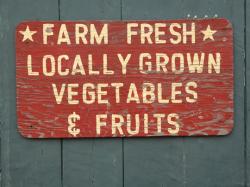Packaged Facts: Four Key Strategies For Marketing 'Local' Foods
December 7, 2015 | 3 min to read

ROCKVILLE, Md. — For retailers, foodservice operators, and food marketers, "local" has become a shorthand descriptor that makes food sound high quality, fresher, more authentic, trustworthy, environmentally friendly, and supportive of the local community. It lends additional credibility to the products, particularly when the farmer or producer is identified in marketing materials with a good back story.
"Like organic products before them, locally produced foods are stepping out of the shadow of their once 'quirky niche' designation to claim a much more prominent and permanent place in the U.S. food and beverage retail-scape," says David Sprinkle, research director, Packaged Facts, which published the 2015 report Shopping for Local Foods in the U.S.
Mainstream retailers are trying to tap into the local foods trend by adding more local products to their stores and highlighting local products through marketing and display. While local and regional grocers may be in the best position to find products from local vendors and market them with authenticity, large national and multi-regional retailers including Kroger, Safeway, Meijer, and even Walmart also have identified local foods as one of their priorities.
In Shopping for Local Foods in the U.S., Packaged Facts estimates that local foods generated $12 billion in sales in 2015, accounting for 2% of total U.S. retail sales of foods and beverages. Looking ahead, Packaged Facts anticipates that over the next five years, local foods will grow faster than the annual pace of total food and beverage sales to approach $20 billion in 2019.
Packaged Facts recommends that when merchandising local foods, retailers should:
- Group local foods together, for maximum impact, rather than letting them languish alongside national brands on the shelf.
- Use "local" signs of shelf talkers to identify all local products. This is also true for eggs from local farms; milk, yogurt, and ice cream from local dairies; and bread from local bakeries, which many retailers buy anyway but do not identify as local products.
- Put a face on local farmers and suppliers with photos and descriptions of them and their operations in store, on the store website, and in materials such as newsletters or brochures. Talk them up to let customers know how close these vendors are to the store and what makes their products special.
- Use events such as in-store sampling and producers' fairs to promote local products.
Shopping for Local Foods in the U.S. examines trends and opportunities in the local foods market, covering all types of retail outlets, farmers' markets, foodservice providers, marketers all types of business models, the role of food hubs, reasons to buy local foods, and government support for local foods programs. Utilizing extensive data from a proprietary Packaged Facts National Consumer Survey conducted in November 2014, as well as other published surveys, the report delves deeply into consumer purchasing, examining what motivates consumers to buy local foods, where they're buying them, and what they're buying and growing themselves. For more information on the report visit: http://www.packagedfacts.com/redirect.asp?progid=88111&productid=8684801.
About Packaged Facts – Packaged Facts, a division of MarketResearch.com, publishes market intelligence on a wide range of consumer market topics, including consumer demographics and shopper insights, consumer financial products and services, consumer goods and retailing, consumer packaged goods, and pet products and services. Packaged Facts also offers a full range of custom research services. Reports can be purchased at www.PackagedFacts.com and are also available on www.marketresearch.com and www.profound.com.
For more essential insights from Packaged Facts be sure to follow us on Twitter and Google+.
Source: Packaged Facts
